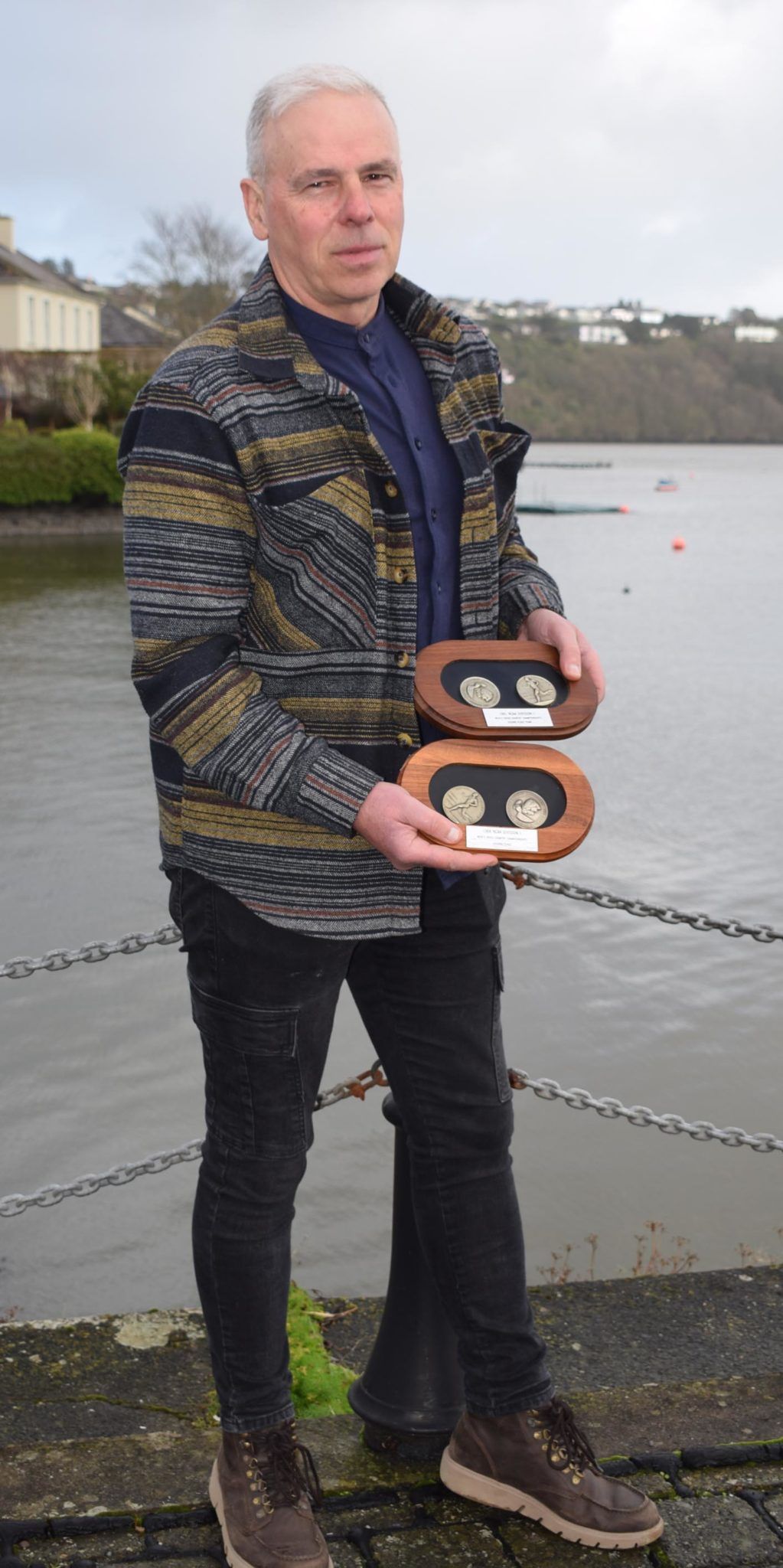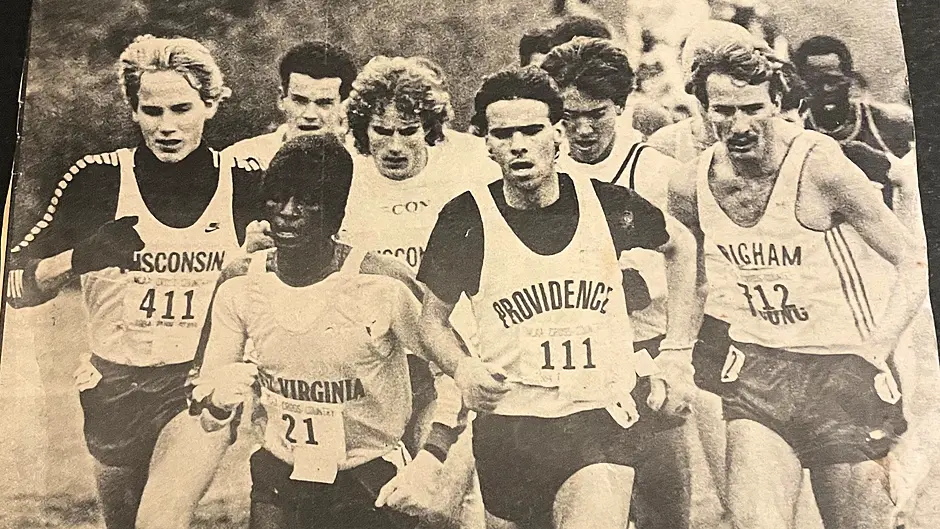BY JOHN WALSHE
‘YOU could say it’s a slightly milder version of the world cross-country,’ states Courtmacsherry native Richard O’Flynn of the NCAA (American Collegiate) championship which took place for the 85th time at Charlottesville, Virginia, recently.
And the man from Barry’s Point should know. Because, almost four decades ago – on November 19th, 1984 – when representing Providence College in Rhode Island he became one of a select group of Irish athletes to medal at these championships.
On that day, over the rolling 10,000m course at Penn State College, O’Flynn finished just seven seconds behind winner Ed Eyestone from Brigham Young University with Yobes Ondieki of Iowa State a further second back in third.
Just to show the quality of that field, Eyestone went on to represent the US in two Olympic marathons and record a best of 2:10:59 for the distance. Kenyan Ondieki would go on to win the 1991 world 10000m title and two years later etch his name in the record books when becoming the first man to break 27:00 for the distance with his 26:58.38 at the Bislett Games in Oslo.
‘The NCAAs attract the best runners in the country, everyone has to qualify and it starts with everyone in a straight line. I’ve gone back to see it a few times since and the ground absolutely rocks with around 200 to 250 people,’ says O’Flynn.
‘The best advice I got was from Ray Treacy [former Providence colleague] when I ran my first one was not to go out too hard, go out strong and after a mile or so try and work your way through. You’re running with fellas around you the whole time’.
Scholarship athletes have just four years of eligibility and, due to injuries and the like, not everyone makes the start line each November. O’Flynn’s four best finishing positions not only show a remarkable improvement but also make him the third most consistent Irishman in NCAA history behind John Treacy and Niall Bruton.
‘I had four good years; in 1981 I was 55th and we were the second team which was unbelievable. We were probably disappointed to finish second again the next year, I finished 17th and it was Brendan Quinn who dragged me around. When you’re running with a team they kind of pull you around,’ he said.
 Richard O'Flynn with his silver-medal winning plaques from the NCAA Cross-Country Championships.
Richard O'Flynn with his silver-medal winning plaques from the NCAA Cross-Country Championships.(Photo: John Walshe)
Another improvement to sixth came in 1983, and then the runner-up spot to Eyestone capped off an exceptional collegiate career.
‘After about three-and-a-half miles that day I found the pace very comfortable so I made a big break. A mile later Eyestone made a break and caught me, I was falling back and going through a bad patch with a stitch,’ O’Flynn recalled.
‘Then it kind of eased off and I looked up and realised second was only up there and I roared down the finish. I was wishing there was another 400 metres to go as I felt I might have got him, but it was great to get second and to hold off Ondieki as I wouldn’t be known as a fast finisher.’
It all began for O’Flynn in the late 1970s when he was first introduced to athletics at Hamilton High School.
‘They were looking to put a team together and like everyone else I ran my first race in football boots. I wasn’t particularly brilliant but Bandon Athletic Club were very kind to me, they used to bring their training group out to Courtmacsherry which meant an awful lot,’ he said.
‘You had people involved at the time like the O’Neills (Diarmuid and Peter), Billy Good, Donough Coughlan and Brendan Crowley who were really nice, just like the people involved today in the club. They were also very open-minded to send me up to meet Donie Walsh to train with. Donie was a huge influence on me as he was an Olympian and someone who had finished second in the NCAAs.’
Success soon followed, with wins in the Cork Novice Cross-Country in 1980, the Munster and National Junior Cross-Country in 1981, along with the senior boys’ 5000m at the Irish Schools the same year. After that, came the offer of an athletics scholarship to Providence College.
Providence at the time was the go-to place for Irish runners. It laid the foundation for John Treacy’s back-to-back world cross-country victories in 1978 and 1979. Although Treacy had now graduated, O’Flynn joined some of the other rising stars such as Ray Treacy, Brendan Quinn, Charlie Breagy, Jimmy Fallon, Richard Mulligan and the like.
‘Coach Bob Amato was a great recruiter, a great organiser, with the best of medical care even by today’s standards. In my third and fourth year I got in touch with Donie Walsh and did something radically different – I started doing 20 x 400m on the track once a week during the cross-country season, which wouldn’t be normal. I admired the coach for letting me do that on my own, he was very open-minded,’ he said.
During his time there, O’Flynn twice won the IC4A cross-country (1983 and 1984) along with the IC4A indoor 5000m in 1985. For his achievements as a college athlete, Richard was inducted into the Providence Friars Hall of Fame in 1999.
‘Providence College was good to me, both athletically and academically. When I graduated I was still running full-time and a couple of years later I was able to go back and do an MBA, which they paid for,’ says O’Flynn, who now works as a general manager for EBS.
Successes on regular visits home include the Irish Inter-Counties Cross-Country at Kilbarry in Waterford in 1985 while on the track he recorded personal bests of 13:38.66 for 5000m and 28:32.6 for 10000m. He also represented Ireland on five occasions at senior level at the world cross-country. In the States, performances on the road included victory in the Boston Milk Run 10km in a course record of 28:23 along with a remarkable streak of consistent finishes in one of the iconic of American races.
Every Thanksgiving Day – November 23rd – for the past 85 years the Manchester Road Race over 4.748 miles takes place in Connecticut. In 1982, O’Flynn finished fourth behind winner Eamonn Coghlan. The following year he moved up to third behind those two Irish legends, Coghlan and Treacy. Another second to Treacy came in 1985 and then, two years later, he had the satisfaction of beating the Olympic silver-medallist but again had to settle for second behind John Doherty despite recording his fastest time of 21:34 for this somewhat unusual distance.
Now back living in his beloved Courtmac, his interest in athletics is maintained through his daughters, Lucy and Olive, who both compete with the Bandon club. ‘They’re enjoying it at the moment, both in athletics and hockey. The main thing for me is that they don’t overdo it, they’re improving and it’s building away nicely for them.’
This past summer, all the family – Richard, wife Fiona, son Conor and daughters Lucy and Olive – travelled to the World Athletics Championships in Belgrade.
And he still meets up on a regular basis with his former colleagues from those glory days at Providence.
‘It’s the friends you make along the way that’s important and thankfully I’m friendly with a lot of guys I ran with and against,’ he said.
Nowadays, Richard is heavily involved with the Great Wild Atlantic Walk which takes place in August over the marathon distance along the coast from Courtmacsherry to Inchydoney and back.
‘It’s a beautiful walk and a real community event. This year we raised €12,000 and every penny goes to the local lifeboat, it’s a joint venture between Courtmacsherry RNLI and Barryroe GAA club,’ he explained.
In the past few years the likes of Newcestown’s Jane Buckley (Providence) and Bandon’s Fiona Nicholson (Temple University) have taken the American scholarship route. They followed on from another Bandon athlete, Breda Dennehy, who carved out a successful athletics career at Western Kentucky. But they all owe a debt of gratitude to the man from Barry’s Point who paved the way when he became the first West Cork athlete to follow that famous phrase ‘Go West, young man’, in pursuit of his sporting dream.










